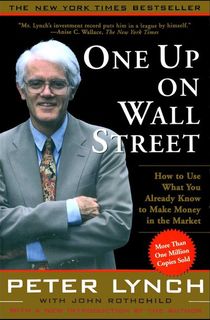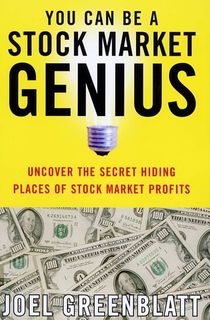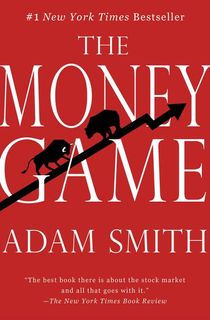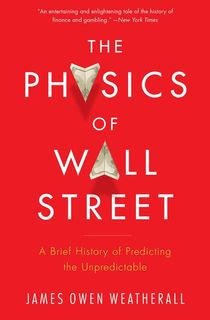In early 2021, GameStop stock made headlines all over the world as it skyrocketed in price, in spite of Wall Street investors “shorting” the stock. Not sure what any of that means? You’re not alone. The GameStop stock situation illuminated many things about the inner workings of the stock market, and also highlighted the power that the internet age has handed over to private buyers and sellers, who may have needed to rely on brokers and other financial agents in the past.
This has left many with the desire to jump aboard this new surge in stock market populism, but unsure of how to begin. The stock market is a confusing world at the best of times, filled with jargon and ups and downs that, from an outside perspective, appear bewildering or downright arbitrary.
Fortunately, there are plenty of books out there that are great introductions for even the most clueless would-be investor. Let’s look at a few of the best ones…

One Up on Wall Street
Legendary mutual-fund manager Peter Lynch makes investing accessible by writing a book that does three important things: teaches investors how to identify portfolio-building, long-term “ten-baggers” before the financial analysts do; gives advice on how to decide which investments are long-shots and which investments are no-shots; and overall, provides you with valuable investment know-how that will guide you into investing in cyclical, turnaround, and fast-growing companies.
Your previously average stock portfolio is only a book away from becoming a star performer.

You Can Be a Stock Market Genius
A successful fund manager's practical and comprehensive guide to the stock market, You Can Be a Stock Market Genius features case studies, important background information, and all the necessary tools to keep up with Wall Street.
In fact, Joel Greenblatt will do you one better: he lays out investment opportunities that the “Wall Street wizards” usually miss, and where the individual investor actually has an advantage. Getting into the nooks and crannies of the stock market, like spin-offs, restructurings, merger securities, rights offerings, recapitalizations, bankruptcies, and risk arbitrage can lead to oft-forgotten opportunities for big profits.

The Money Game
What’s the difference between a bear market and a bull market? What are the safest types of investments? How do we capitalize on growth? Readers will learn all this and more in Adam Smith’s The Money Game, which The New York Times Book Review calls “the best book there is about the stock market.”
More than just understanding the intricacies of the market itself, however, Smith helps would-be investors understand of importance of knowing themselves, knowing their own tolerance for risk, what drives their investment behaviors, why we want to get rich, and what success in investing means for us.

The Intelligent Investor
Topping any number of lists of the best stock market books for beginners is this classic by Benjamin Graham, the so-called “father of value investing.” Graham taught Warren Buffett, among others, who called this “the best book about investing ever written.”
Last revised and updated in 2009, this handy how-to guide may not be the most up-to-date book on this list, but it’s been around since 1949 for a reason: if you want to have everything you need to start investing and learning about the market right at your fingertips, it’s an indispensable place to start.

The Little Book That Beats The Market
Need more specific investing advice? It’s hard to go wrong with Joel Greenblatt’s handy and accessible Little Book That Beats the Market. Readers will find the foundational tools they need to begin picking stocks, while learning the ins and outs of what makes the stock market tick, without being weighted down by a lot of stock market jargon that new investors won’t understand.
With an established system of buying good stocks at affordable prices, this book – which added a “still” to its title in the most recent editions – is a practical how-to for the newbie investor.

Broke Millennial Takes On Investing
Many new investors are on the younger side, only just now coming into a stock market that has undergone seismic shifts in the last two decades, especially since the economic crash of 2008.
For them, Erin Lowry’s Broke Millennial series (this is the second book) is an indispensable guide that speaks your language and tackles the problems and challenges of investing in modern, real-world terms, including everything from how to find (reliable) investment advice online to picking stocks that are socially responsible.

A Random Walk Down Wall Street
As you’ve probably figured out by now, investing is a lot more than just picking a stock and paying some money for it. This handy guide for beginners walks new investors through a variety of different investment strategies, helping would-be investors find the one that’s right for them.
Originally published in 1973, this essential guide has remained in print across a dozen editions, with the 2020 release including new information on bitcoin and other cryptocurrencies. Don’t even know what a “random walk” means in stock market jargon? This is the place to learn.

The Coffeehouse Investor
For most of us, investing is a means to an end. That end may be a more comfortable life, a secure retirement, college tuition for our kids, a bigger house, or starting our own business. Whatever the case may be, we all have other things that we would rather be devoting our time and energy to than watching to stocks rise and fall.
Bill Schultheis, a longtime investment advisor for Smith Barney, gets that. And it led him to put together a book aimed at casual investors, AKA people who want to build wealth without letting it overtake their lives. If that’s you, then this slim volume is a must-read!

The Physics of Wall Street
Sure, Wall Street follows certain rules, which you’ll learn in some of the other books on this list, but those rules are generally seen to be the realm of laws, or regulations, or mathematics. Statistics and “market forces.”
In this fascinating book, author James Owen Weatherall shows how physicists influenced the market, and how physics may yet provide some of the models that will shape how we invest going forward. From models designed to predict earthquakes instead predicting market crashes to how quantum theory may affect the Consumer Price Index, this fascinating volume takes you through both the history and the possible future of a Wall Street where physics can (and often does) rule.

Business Adventures
It can be easy for books about finance and investing to become dry, but not so with this collection of twelve tales of iconic corporate adventure (and misadventure) from longtime New Yorker contributor John Brooks.
In analyzing these famous – and sometimes infamous – moments in corporate history, he shows how the behavior of corporations can affect everyday investors, and how Wall Street shapes so much of our daily lives … all while telling engaging stories that will keep readers glued to the page.
Keep Reading: 10 Books on Capitalism to Help You Understand the World
This post is sponsored by Open Road Media. Thank you for supporting our partners, who make it possible for Early Bird Books to continue publishing the stories you love.
Featured photo: Jason Briscoe / Unsplash





